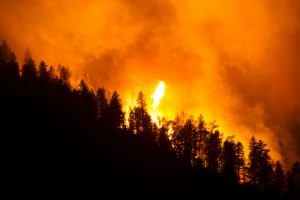
U.S. House appropriators should provide robust funding to programs in the Interior and Environment Appropriations Bill that will support improved wildfire preparedness, mitigation and response across the United States, according to a recent letter from U.S. Rep. John Curtis (R-UT) and six of his colleagues.
Wildfire damages in 2020 across the United States totaled $16.5 billion, ranking it as the third-costliest year on record, wrote the lawmakers, who included U.S. Rep. Joe Neguse (D-CO). Reps. Curtis and Neguse are co-chairs of the congressional Bipartisan Wildfire Caucus, which they launched in February to elevate awareness and bipartisan consensus around wildfire management and mitigation, and wildfire preparedness and recovery.
In their letter, the congressmen pointed out that three separate fires in California and one in Oregon generated more than $1 billion in losses, while 12 other fires in California, Oregon, Colorado, and Washington each caused over $100 million in direct losses.
In addition to the widespread economic toll of these fires, the direct death toll from the 2020 wildfire season is at least 43, wrote Rep. Curtis and the lawmakers.
“According to research from Stanford University, the indirect death toll due to inhalation of wildfire smoke is estimated to be in the thousands,” they wrote. “Authors of the study estimate that wildfire smoke likely is responsible for 5,000 to 15,000 deaths in an average year in the U.S.”
In seeking more funding to programs in the Interior and Environment Appropriations Bill, the lawmakers wrote that funds could be used to increase the pace and scale of hazardous fuels management and forest restoration; improve ecosystem health; reduce the risk of severe flooding and erosion in forests after fire; protect critical watersheds; and bolster support for the wildland firefighting workforce, according to their letter.
“It is imperative that the federal government prepares to respond and recover after a wildfire starts,” said Rep. Curtis. “Equally important is our ability to prevent disasters in the first place and ensuring that mitigation programs are adequately funded is the first step.”
“I am proud to have led this letter with the Bipartisan Wildfire Caucus advocating for robust funding for wildfire-related programs to bolster our critical wildfire prevention, response, and recovery programs,” he said.



